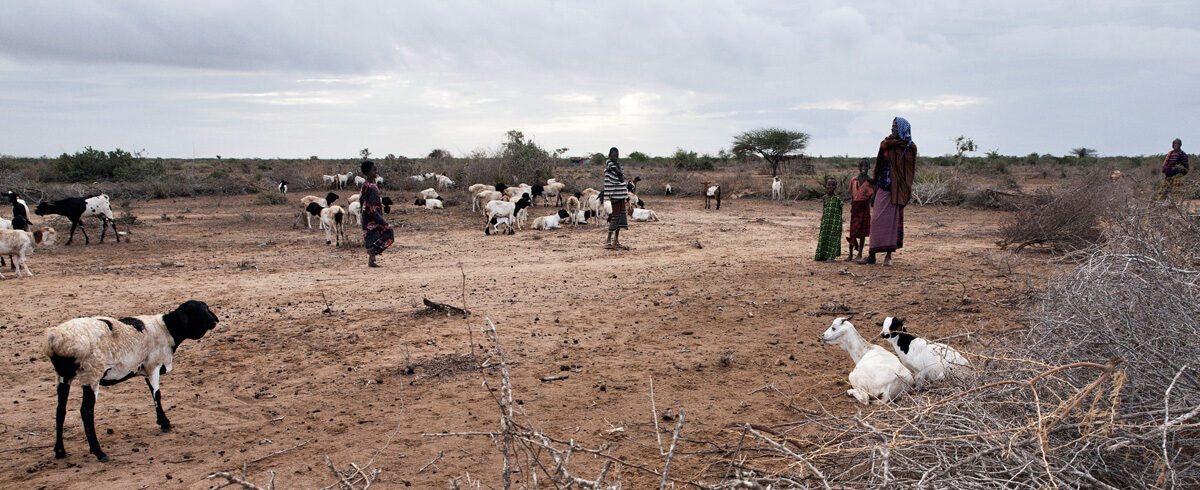Launch of BIMA – a research project to build climate resilience of pastoral communities in Kenya
/
BIMA”, which means “insurance” in Kiswahili aims at “Improving Livestock Insurance Trigger Mechanisms and Gender-Responsive Products for Drought-Affected (agro-)Pastoralists in Kenya”. The project is part of the Climate Adaptation and Resilience (CLARE) initiative and focuses on improving the capacity of (agro-)pastoral communities in Kenya to cope with climate shocks through a more effective and gender-responsive insurance package including livestock insurance.
Pastoralist households in the Arid and Semi-Arid Lands (ASALs) of Kenya face high vulnerability to climate change risks. These communities often resort to selling their remaining livestock during droughts, which pushes them into poverty. Observed regional impacts of climate change on ecosystems and human systems show that increasing weather and climate extreme events have exposed many pastoral communities to acute food insecurity and reduced water security (IPCC 2022).
To address this, a commercial insurance product called Index Based Livestock Insurance (IBLI) was introduced in Kenya in 2010, providing asset protection and security planning by enabling the purchase of fodder and water to prevent drought-induced livestock death. Although IBLI showed potential as a sustainable alternative to emergency drought relief, limitations in the existing index[1]‘s accuracy led to its withdrawal from the market in 2022. Additionally, given the evolving and unpredictable effects of climate change on rangelands, IBLI alone may not be financially viable in the long term
The “BIMA” project, launched today at the Africa Climate Week jointly by UK Foreign Commonwealth and Development Office and Canada’s International Development Research Centre, aims to develop an innovative insurance package that combines livestock coverage with other asset insurance products. This approach aims to enhance the commercial viability and timely distribution of insurance payouts for pastoralists, allowing them to navigate climate uncertainties more effectively.
“I am proud to see “BIMA” project taking shape, enabled by the long-standing, successful partnership between IDRC and UK FCDO and by exciting partnerships with researchers and practitioners around the world. We are looking forward to seeing these partners co-producing needs-driven, action-oriented research that will use science and innovation to address short-term climate shocks whilst enabling long-term, sustainable, and equitable development.”
Professor Charlotte Watts, UK FCDO Chief Scientific Adviser and Director for Research and Evidence.
The research team, collaborating with communities, insurance firms, the International Livestock Research Institute (ILRI), and government agencies, will over the next 42 months use Tana River County as a case example and focus on how to contribute to increasing climate resilience of the livelihoods of agro-pastoral communities in Kenya through a more effective and gender-responsive insurance package including livestock insurance to ensure the economic viability of the product.
“We will collaborate with a local insurance firms to translate and validate the research findings with the simulation of newly identified products for testing, develop payment amounts for the new products, participate in collaborative discussions for validation and dissemination of research findings.”
Professor Nicholas O. Oguge, Principal Investigator (PI) for the research and Professor of Environmental Policy at the Faculty of Law (University of Nairobi, Kenya),
Implemented by a consortium comprising the International Committee for Development of Peoples (CISP) as lead institution, the University of Nairobi, Translate into Meaning (TriM), and the Collaborative Center for Gender and Development (CCGD). The study will contribute to the positive impact of the CLARE programme by developing actionable adaptation solutions that support the most vulnerable. Ultimately, the outcomes of the project are poised to make a significant impact on the lives of agro-pastoralists in the ASAL areas of East Africa by safeguarding assets during droughts and promoting gender equality and inclusion.
“IDRC’s longstanding partnership with the UK has been of great value for the advancement of sustainable development. The CLARE project announced today represent the focus of our partnership – supporting Southern-led climate-adaptation research to identify innovative solutions and help build long-term resilience while promoting gender equality and inclusion”
Julie Shouldice, IDRC Vice-President, Strategy, Regions, and Policy.
Originally posted at: Launch of BIMA, a research project to build climate resilience of pastoral communities in Kenya. | University of Nairobi (uonbi.ac.ke)
Categories
Countries
CLARE Pillars
CLARE Themes
CLARE Topics


